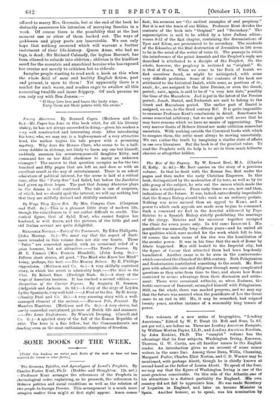The Rise of the Papacy. By W. Ernest Beet, M.A.
(Charles H. Kelly. Ss. 6d.)—Mr. Beet carries on the story of a previous volume. In that he dealt with the Roman See, first under the pagan and then under the early Christian Emperors. In this book, distinguished by the moderation of its tone, as well as by its able grasp of the subject, he sets out the causes which made the See into a world-power. From early times we see, now and then, indications of the future. It was, indeed, antecedently improbable that the Roman Bishop should take rank as an ordinary prelate. Nothing was more natural than an appeal to Rome, and a power to which such appeals are made soon begins to command. Such a command W3 find in the dacretal addressed by Pope Siricius to a Spanish Bishop strictly prohibiting the marriage of the clergy. Siricius and his successor together occupied the Chair for seven years only. In 432 Came Innocent I. His pontificate was unusually long—fifteen years—and he united all the qualities which were needed for the work which fell to him. Of course the main cause of his rise was the humiliation of the secular power. It was in his time that the sack of Rome by Alaric happened. Men still looked to the Imperial city, but the figure of Caesar that attracted them had been hopelessly humiliated. Another cause is to be seen in the controversies which convulsed the Church of the fifth century. Both Pelagianism and Nestorianism contributed something to the result. Mr. Beet goes with admirable cam and diligence through many complicated questions as they arise from time to time, and shows how Rome contrived to secure advantage from their discussion and settle- ment. There were occasional setbacks, as when Zosimus, the feeble successor of Innocent, entangled himself with Pelagianism. Still, on the whole, there was marked progress, and we may say that the future VIM assured when the pontificate of Leo the Great came to an end in 560. He, it may be remarked, had reigned twenty years, another instance of a seasonably long tenure of power.














































 Previous page
Previous page